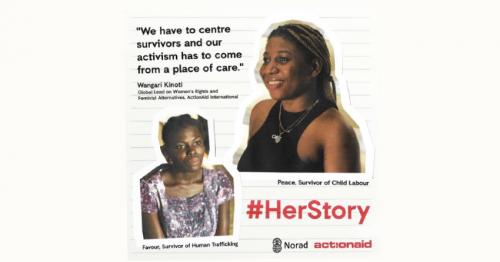
https://actionaid.org/news/2022/actionaid-launches-first-anti-modern-sla...
Latest reports reveal that an estimated 50 million people are trapped in situations of modern slavery, an increase of 10 million since 2017. Women and girls account for 4.9 million in forced commercial sexual exploitation, while 22 million were in forced marriages. 28 million are trapped in forced labour with majority of cases (86%) found in the private sector.
#HerStory campaign, features first-hand accounts of modern slavery by female survivors from across the world. The campaign urges governments to ratify the International Labour Organisation (ILO) Convention 190, adopt a legally binding instrument to prevent human rights and corporate abuse, promote decent work for women and support the achievement of SDG target 8.7.
Modern slavery crimes (including trafficking, forced labour, child labour, debt bondage and forced marriage), disproportionately affect women and girls, who are particularly vulnerable to sexual and gender-based violence, extreme isolation, withheld wages and an increase in care responsibilities. In addition, situations of crisis linked to conflict, disasters, climate change, COVID-19 and extreme poverty have further exacerbated many of the factors that contribute to the ongoing prevalence of modern slavery.
The International Day for the Abolition of Slavery was declared by the United Nations following the adoption of the UN Convention for the Suppression of the Traffic in Persons and of the Exploitation of the Prostitution of Others in 1949. The day is marked globally to raise awareness of and combat modern slavery.
Wangari Kinoti, Global Lead on Women’s Rights and Feminist Alternatives, ActionAid International, said “Modern slavery continues to be a serious concern. We owe it to the 50 million people trapped in modern slavery situations to bring salience to these issues and urge governments to ratify ILO C190, adopt a legally binding treaty for business and human rights and unite to end modern slavery crimes. This campaign is timely. Women and girls account for around three quarters (71%) of those in modern slavery. We must dedicate the space for survivors to be heard and hold businesses and governments accountable.”
Racha Nasreddine, Regional Director, ActionAid Arab Region, said: Modern slavery is widespread across the Arab Region. Daily, we witness exploitation of migrant workers, child labour, forced marriage and many other forms of modern slavery that prevail due to the fact that the existing system that enables abuse is grounded in our laws and societal norms. We all have a critical role to play in fighting modern day slavery. At ActionAid Arab Region we continue to work with women led organizations in Lebanon to campaign against forced marriage and implement projects that combat gender-based violence in local communities, we also recognize the challenges women face in the workplace. In Jordan we are implementing projects that promotes safe work environments for women in the private sector and industrial factories as they increasingly face harassment at work”.
For interview requests or images and case studies from #HerStory and ActionAid’s work on modern slavery, including the Combatting Modern Slavery project[AF1] , please contact media-enquires@actionaid.org
Notes to Editors
About Combatting Modern Slavery, ActionAid’s anti-modern slavery project
In 2021, ActionAid launched the Combatting Modern Slavery project in Ghana and Ethiopia with support from the Norwegian Agency for Development Cooperation (Norad). The initiative, which is set to run until December 2023, aims to contribute to a decrease in the scale and prevalence of modern slavery by working towards three common objectives:
- Governments implement measures to prevent, identify and address modern slavery, and to protect and monitor vulnerable groups and victims of modern slavery.
- Businesses have implemented anti-modern slavery measures to prevent, identify and tackle the use of human trafficking, forced labour and child labour in their own operations and supply chain.
- Vulnerable individuals and groups are more capable of resisting and seeking redress on their recruitment into modern slavery.










Add new comment